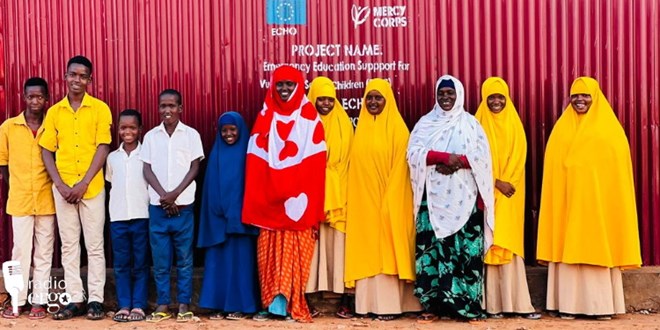
Thursday November 10, 2022

Madino (third from right) in school to see her children learning and getting meals/Mahad Abshir/ Ergo
(ERGO) – Madino Abdikadir Hassan had to pull three of her children out of Amoud school in the Somali town of Galkayo when they no longer had the energy to walk there and back on empty stomachs.
However, when the school started providing free breakfasts and lunches on 1 September, this proved the right incentive for her to send the children back to resume their education.
“We have seen such changes in the students! They get their dinner at night as we can afford to give them one meal a day. They also get porridge in the morning and some rice with some fish at school. Their bodies seem to be getting good nutrition,” Madino told Radio Ergo.
“We were afraid that if they grew up without education, they could become street children and start sniffing glue or even join gangs.”
Madino’s large family has lived in Arafat IDP camp on the outskirts of Galkayo for six years, depending on the $3-4 brought home by her husband working as a porter. They struggle to put enough food on the table for all the children.
“We are a family of 15 members so one or two cans of grain aren’t enough, we need four cans and that costs $3, and we still don’t have cooking oil or sugar. There is no milk for the children or even cooking charcoal. Three or even five dollars isn’t enough,” she explained.
The school administration waived the $5 tuition fees when Madino complained they could not pay.
This school meals programme by Galmudug education ministry and the UN’s World Food Programme (WFP) will feed 5,000 students from 43 schools in Mudug region over a five-month period. The students are all a from poor background and risk missing out on their education due to lack of food.
The headteacher of Amoud school, Ali Omar Mooge, told Radio Ergo the meals had brought noticeable changes to the school’s 132 students.
“I believe the school wouldn’t have been able to continue otherwise. Now 35 students who had left have returned to the school, and 20 others have enrolled for the first time. The school’s continuity had been at risk,” said Ali.
Saido Osman Ali, a mother of eight, supports her children alone from the proceeds of hawking samosas in the streets of Galkayo, as her elderly husband stays at home without work. Her earnings dropped due to the prolonged drought and rising inflation, and she removed her children from school in August.
However, after hearing about the school meals programmes, she sent them back to Abdullahi Isse school in October.
Now she can divide her daily $4-5 income to cater for their dinner and the school fees of $30 for her five children.
“We have had drastic changes. The children I would take loans for no longer need them. We used to cook half a kilo of flour to make bread, but now we use just a quarter. We don’t cook lunch and we cook some beans at night. We have noticed changes in the children and also changes in the money that we can save. I estimate that half of our problems have been lifted,” she declared.
Saido is managing to put aside half a dollar every day to pay off the $280 in loans she has amassed buying food for the family in local stores.
The director of the feeding programme at the education ministry, Maryan Abass Hassan, told Radio Ergo that many families cannot afford both food and education costs for their children.
“The school meals programme has demonstrated that the families in the IDP camps and in poor parts of Galkayo do not have enough food since severe drought took a toll on their livestock which has been the main source of income for the population in this region.
“We prioritised the schools based on the needs. Every school gets something different based on the students. We hope that the students will also increase in numbers.” said the director.